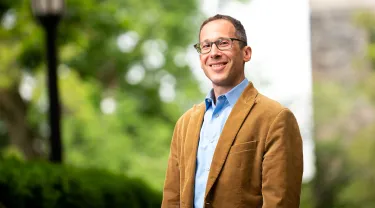When it comes to ballot referendum questions, preparing to vote on Election Day can be a daunting process. As political ads and mailers make arguments on either side of these questions, it can sometimes be difficult to determine what the questions are, in fact, asking, and what the true impact of a “yes” or “no” vote is.
For Massachusetts residents, Tufts’ Center for State Policy Analysis (cSPA), run by Executive Director Evan Horowitz, offers much-needed clarity on those questions and other issues of concern to Bay State voters—and the state’s lawmakers.
The center’s aim is to ensure that lawmakers and residents in Massachusetts have access to the best information on effective public policy. Through widely disseminated reports, it shares expert analysis of legislative and electoral policy issues in Massachusetts to give lawmakers the information they need to improve their legislation, to help citizens understand—and productively debate—the stakes of new laws and ballot initiatives, and to allow advocates to gauge the tradeoffs in proposed regulations.
For example, in November 2022, there were four questions on the Massachusetts ballot. Through their detailed reports on each one, cSPA helped voters understand ballot initiatives on: imposing new financial requirements on dental insurers; analyzing the potential benefits, underappreciated risks, and common arguments for and against raising taxes for people with very high incomes; parsing a proposal to allow chain stores to sell beer and wine at more locations; and offering an exploration of a vote to affirm or annul a law offering Massachusetts driver's licenses to unauthorized immigrants.
Horowitz brings to this work a wealth of expertise in policy analysis, including from his time at several Massachusetts think tanks. And prior to joining cSPA, he wrote a column for the Boston Globe that used data to tell stories about policy issues affecting Massachusetts and the nation as a whole.
“Having spent time in academia, at think tanks, and in journalism,” Horowitz said, “I think there’s a real opportunity to start bridging these worlds by producing relevant, rigorous, readable research on a time frame that works for policymakers.”
